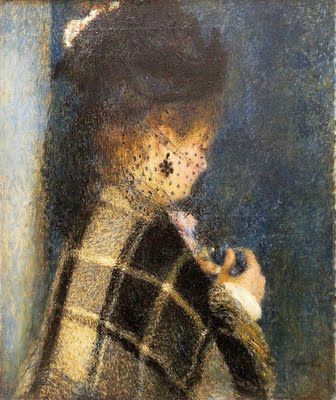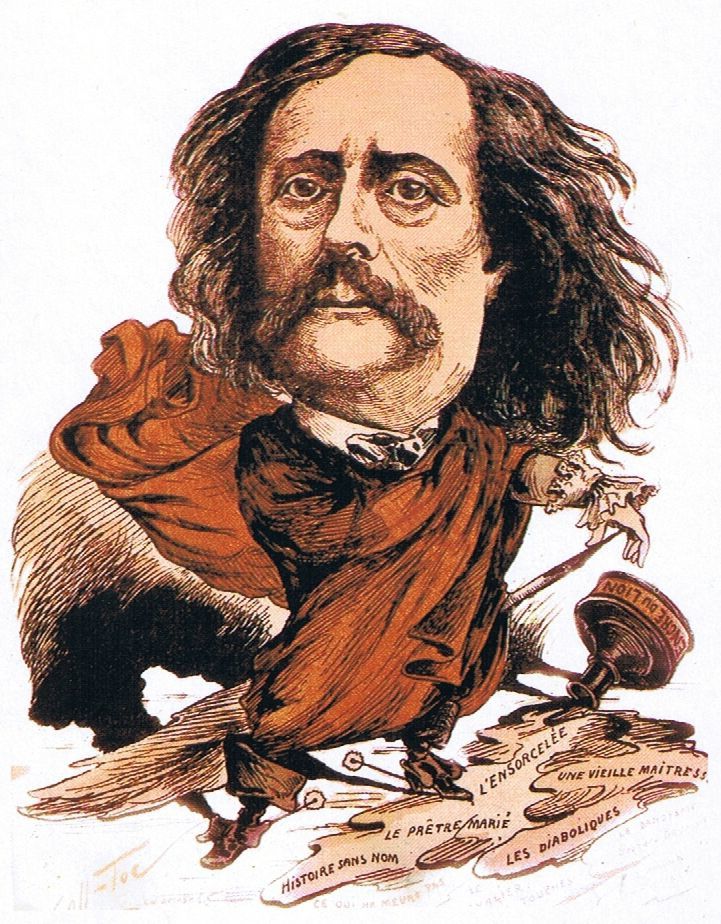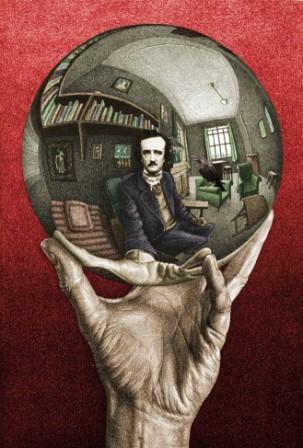Le bonheur dans le crime (part 3)
 Monday, February 27, 2012 at 17:12
Monday, February 27, 2012 at 17:12 Part three of a story ("The happiness in crime") by this French writer. You can read the original here.
 "The whole day through, a foil in her hand, her face beneath the mesh of her fencing mask rarely removed, she did not often leave her father's fencing hall. Her father was starting to show his age and she frequently gave lessons in his stead. She very seldom ventured out on the streets, and proper women could only see her there or on Sundays at mass. But even on the streets or at Sunday mass she was almost as masked as she was at her father's fencing hall, the lace of her black veil even darker and tighter than the mesh of her iron mask. Was there any affectation in this manner of showing or hiding herself which, in turn, excited curious imaginations? This was quite possible. But who knew? Who could say? And so, regarding this girl, who remained masked by her veil, was her character even more impenetrable than her face, as subsequent events would show?
"The whole day through, a foil in her hand, her face beneath the mesh of her fencing mask rarely removed, she did not often leave her father's fencing hall. Her father was starting to show his age and she frequently gave lessons in his stead. She very seldom ventured out on the streets, and proper women could only see her there or on Sundays at mass. But even on the streets or at Sunday mass she was almost as masked as she was at her father's fencing hall, the lace of her black veil even darker and tighter than the mesh of her iron mask. Was there any affectation in this manner of showing or hiding herself which, in turn, excited curious imaginations? This was quite possible. But who knew? Who could say? And so, regarding this girl, who remained masked by her veil, was her character even more impenetrable than her face, as subsequent events would show?
"Of course, my dear sir, I am obliged to hasten through all the details of that time, so as to gain more quickly that juncture at which this story really begins. Miss Hauteclaire was about seventeen years old. The former Adonis, the Pointe-au-corps, had become quite an old man: a widower; morally slain by the July Revolution, which had left the nobles in mourning for their castles and emptied out his fencing hall, he plied himself in vain with medication, which did not fear to send its covert signals, and went trotting off to the cemetery. For a doctor making the diagnosis, things were quite clear. You could see it. I had just told him that it would probably not be long now when, one morning, he was brought to his fencing hall by the Viscount of Taillebois and the Chevalier of Mesnilgrand to meet a young man from the far-off high country who had returned to live in the castle of his recently deceased father.
"This was the Count Serlo of Savigny, the so-called 'pretendant' (in V.'s small town vernacular) of Miss Delphine of Cantor. The Count of Savigny was certainly one of the most brilliant and the most foot-stompingly impatient young people among a generation of young people who all shared, by degrees, this impatience, because there was (in V. as there was elsewhere) true youth in this old world. There are no more people like that at present. He had heard a lot about the famous Hauteclaire Stassin and wanted to behold this miracle with his own eyes. He found her as she was: an admirable girl, prickly and as provocative as the devil in her knitted silk shoes, which foregrounded her Athena of Velletri shape, and her black Morocco blouse which, as it cracked, pinched her robust and unfastened waist – one of those waists which Circassians can only achieve by imprisoning their daughters in leather belts that nothing other than the development of their bodies can break. Hauteclaire Stassin was as serious as Clorinda. He watched as she gave him the lesson and asked to cross swords with her. But he was hardly the Tancred of the situation, this Count of Savigny! Miss Hauteclaire Stassin repeatedly bent her sword into a sickle on the chest of the handsome Serlo, yet she was not touched once.
"'You cannot be touched, mademoiselle,' he said gracefully. Could it be an omen? And was the young man's self-esteem, from that evening on, defeated by love?
"From that evening on, as it were, the Count of Savigny came by every day for a lesson in the fencing hall of Pointe-au-corps. The castle of the Count was only a few leagues away, and he devoured this distance either on horseback or by coach. And yet this went unnoticed in this chatty nest of a small town where the smallest things were pieced together on the tip of the tongue, but where the love of fencing explained everything. Savigny did not confide in anyone. He even avoided having his lesson at the same time as the town's other young people. He was a boy who did not lack for depth, this Savigny. What happened between him and Hauteclaire, if it happened at all, no one at the time knew for sure or even suspected. His marriage to Miss Delphine of Cantor, stopped by the parents of both families years before, but now too advanced not to conclude, took place three months after the Count's return. And even this was an opportunity for him to live a month in V., close to his fiancée, with whom he systematically spent every day. But every evening, from this same location, he went very regularly to his lessons.
"Like everyone else, Miss Hauteclaire had heard in the parish church of V. the banns proclaimed for the Count of Savigny and Miss Cantor. But neither her attitude nor her physiognomy revealed that she would take any interest in these public statements. It is true, however, that no one present had been assigned to watch for such behavior. Observers on this question had yet, so to speak, to be born – that is, on the question of a possible link between Savigny and the beautiful Hauteclaire. Once the marriage had been celebrated, the Countess went with her husband very quietly to settle into her Castle. Yet the Count did not give up his urban habits and still came to town every day, which was, anyway, what many castle owners of the region did.
“Time passed. The old Pointe-au-corps died. After being closed briefly, his fencing hall reopened. Miss Hauteclaire Stassin announced that she would continue the lessons of her father and, far from having fewer students after his death, she now had many more. Men are all the same. Strangeness on the part of one man towards another displeases and wounds them. But if the strangeness comes from someone in a skirt, they go crazy for it. A woman who does what a man does – even if she doesn’t do it as well as a man might – will in France always have a marked advantage over a man. But Miss Hauteclaire Stassin, for what it was she did, did it much better than any man. She became a much greater fencer than her father. As a demonstrator during the lesson, she was magnificent; and in the grace and elegance of her game, she was incomparable. She had irresistible strikes – movements as rarely learned these days as the proper touch of a violin bow or how to shift your hand on that selfsame instrument to reach the highest notes – things that no amount of instruction can place at the disposal of the learner.
"At the time I, too, clanked some iron, as did everyone whom I knew in that little world, and I confess that, in my capacity as an amateur, several of her moves enchanted me. She had, among other things, a disengagement of high inside to high outside that had the feel of magic. This was no longer a sword that hit you, it was a ball! The fastest man in the parry could only whip through the wind, even when she had warned him that she was about to disengage; and without fail, the thrust would hit him in the shoulder and the chest. His foil crossed no iron! I’ve seen fencers lose their minds over this blow, which they called an illusionist’s legerdemain and could have swallowed their foils in fury! If it had not been a woman one would have picked a fight with him for that blow. If it had been a man, it would have resulted in a score of duels.
"Moreover, apart from this phenomenal talent so scarcely granted to a woman – a talent from which, one should add, she lived nobly – another sidelight about this poor girl was quite interesting. By dint of the fact that she was without another resource other than her foil, she found herself hobnobbing with the richest young people of the city (among whom, it should be said, were some very bad subjects and some very smug subjects) yet her good reputation did not suffer. No more about Savigny than about anyone else; the reputation of Miss Hauteclaire Stassin was never grazed. 'But she seems like an honest girl,' proper women would say, as they would have said of an actress.
"And since I started to talk about myself, I, who love playing the observer, was of the same opinion as the entire town on the subject of Hauteclaire’s virtue. I would sometimes go to the fencing hall, both before and after the marriage of Mr. Savigny, and there I never saw that girl as anything but serious, fulfilling her function with simplicity. She was very impressive, I must say, and she made everyone respect her on equal footing, neither being overly familiar nor abandoning any part of herself. Her physiognomy, extremely proud, did not at that time evince that passionate expression which, as you must have just noticed, was very striking. Nor did it betray any sorrow, concern, or anything ultimately that might have led us – even in the most remote way – to suspect the surprising thing which, in the atmosphere of a small town both quiet and routine, had the effect of a cannon blast shattering all the windows.
“Miss Hauteclaire Stassin had disappeared!
"She had disappeared: How? Where had she gone? It was not known. But what was certain was that she had disappeared. First there had been a cry followed by silence, but the silence did not last long. Tongues began to wag. Tongues that had been held too long – like water in a lock which, once the sluice has been opened, rushes forth and spins the wheel of the mill with fury – began to froth and blather on about this unexpected, sudden, and incredible disappearance which nothing could explain, because Miss Hauteclaire disappeared without saying a word to anyone. She had disappeared like one disappears when one really wants to disappear. This was not a disappearance that still left behind something, a trace, which others might take to explain the disappearance. She had disappeared in the most radical way.
"She did not, however, 'make a hole in the moon,' that is to say, empty the coffers and run off with embezzled money or escape from her creditors, since she left behind as many debts as anything else – in other words, none at all. But one may reasonably aver that she did ‘make a hole in the wind.’ The wind blew through and did not bring her back. The mill of tongues did not turn any less so as not to stop turning, and began cruelly to grind this reputation that had never given anyone the leverage to denigrate it. It was reconsidered, examined with a fine-tooth comb, sifted through and carded. How and with whom did this girl, so proud and so correct, depart? Who took her away? Because, of course, she must have been taken away. For this there was no answer.
"It was enough to make the town go mad with fury and, indeed, that is what happened to V. And there were so many reasons to be angry! First, the town lost what was not known. Then it lost its hopes on account of a girl whom it thought it knew, and whom it actually did not know, since she had been deemed incapable of disappearing in this way. Then, again, it lost a girl it thought it would see grow older and get married, just like the other girls of the village, interned in this chessboard box of a provincial village like horses in a ship’s steerage. Finally, it lost, in losing Miss Stassin, who was no longer this same Stassin, a fencing hall celebrated all around which had been the distinction, the ornament and the honor of the town, its cockade on the ear, its flag on the bell tower.




